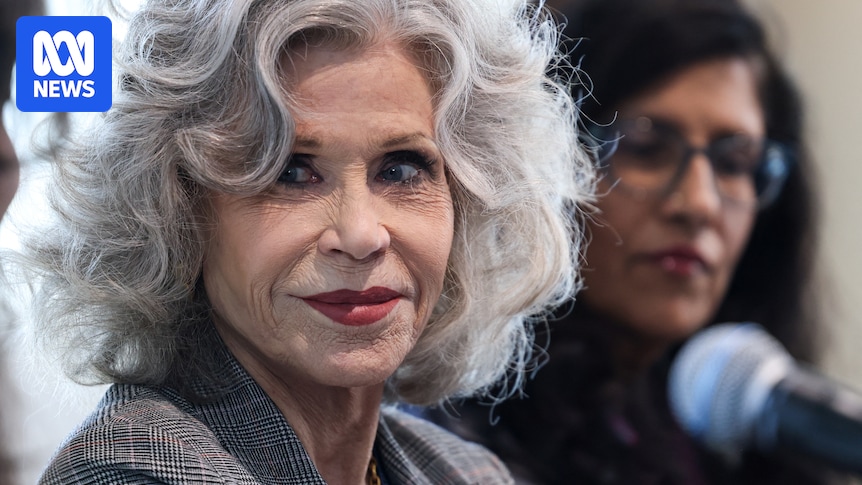
Jane Fonda is spearheading a revival of the Committee for the First Amendment, joining forces with over 500 celebrities and Hollywood figures to champion free speech. This initiative, announced on October 1, 2025, includes notable names such as Jamie Lee Curtis, Viola Davis, Whoopi Goldberg, Pedro Pascal, Natalie Portman, and Michael Keaton. Renowned directors like Spike Lee and Ben Stiller, along with singer Barbra Streisand and pop sensation Billie Eilish, have also pledged their support.
Fonda, who has been a vocal advocate for progressive causes since the 1970s, emphasized that this effort is not entirely new but rather a relaunch of an organization her father, actor Henry Fonda, was involved with. The original Committee for the First Amendment emerged in 1947 during a turbulent period for Hollywood when the US government suspected communist influence in the film industry.
Historical Context: The Hollywood Blacklist
The original Committee for the First Amendment was formed in response to the House Un-American Activities Committee (HUAC) hearings, which accused Hollywood of communist infiltration. These hearings, beginning in 1947, invited 23 “friendly” witnesses, including Ayn Rand, to testify against alleged communist propaganda in films.
Films such as “Song of Russia” and “It’s a Wonderful Life” were scrutinized for their perceived political messages. The HUAC hearings, which demanded individuals to “name names,” led to the blacklisting of hundreds of industry professionals, effectively ending many careers.
Fighting Back: Hollywood’s Stand
In response, prominent Hollywood liberals, recognizing the hearings as an attack on free speech, rallied together. Ira Gershwin hosted the first meeting of the Committee for the First Amendment, with attendees like Judy Garland, Humphrey Bogart, and Gene Kelly. The committee quickly raised funds and organized a demonstration in Washington, producing a radio broadcast titled “Hollywood Fights Back” to defend artistic freedom.
Despite their efforts, the committee faced significant challenges. The Hollywood 10, a group of screenwriters and directors who refused to testify, were cited for contempt of Congress and served prison sentences. Additionally, the “Waldorf Declaration” by studio executives cemented the blacklist, banning known communists from the industry.
Revival Amid Modern Parallels
The revival of the Committee for the First Amendment comes at a time when parallels to the blacklist era are emerging. The Trump administration’s attempts to silence comedians critical of the government, such as Jimmy Kimmel, echo past efforts to suppress dissenting voices. Furthermore, Hollywood has seen a resurgence in labor organizing, with many committee members actively participating in the 2023 screenwriters and actors strikes.
According to a recent Marist poll, 80% of Americans believe that First Amendment freedoms are increasingly restricted, highlighting the ongoing relevance of the committee’s mission. While debates continue over the historical blacklisting of Hollywood figures, the new committee aims to safeguard the rights of artists to express themselves freely.
Lessons from the Past
The blacklist era is often viewed as a period of capitulation by progressives, yet many filmmakers used allegory and creativity to convey progressive messages. Films like “The Pajama Game” subtly addressed labor issues, demonstrating resilience in the face of repression.
The revival of the Committee for the First Amendment underscores the importance of protecting artistic expression. As actress Katharine Hepburn once stated in a speech written by Dalton Trumbo, one of the Hollywood 10,
“Silence the artist, and you silence the most articulate voice the people have.”
Looking Forward: The Fight Continues
The renewed Committee for the First Amendment serves as a reminder of the dangers of censorship and the need to defend free speech. By drawing attention to past injustices and current threats, the committee hopes to inspire a new generation to value and protect the freedoms enshrined in the First Amendment.
As the entertainment industry faces new challenges, the legacy of the original committee and its modern iteration highlight the enduring struggle for free expression. The movement initiated by Jane Fonda and her fellow celebrities represents a continued commitment to ensuring that the voices of writers, artists, and filmmakers are not silenced.







